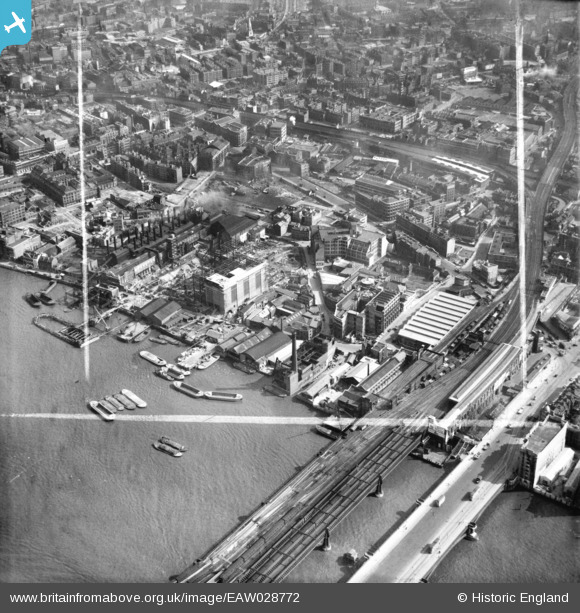EAW028772 ENGLAND (1950). Bankside Power Station under construction and environs, The Borough, 1950. This image was marked by Aerofilms Ltd for photo editing.
© Hawlfraint cyfranwyr OpenStreetMap a thrwyddedwyd gan yr OpenStreetMap Foundation. 2025. Trwyddedir y gartograffeg fel CC BY-SA.
Delweddau cyfagos (20)
Manylion
| Pennawd | [EAW028772] Bankside Power Station under construction and environs, The Borough, 1950. This image was marked by Aerofilms Ltd for photo editing. |
| Cyfeirnod | EAW028772 |
| Dyddiad | 20-April-1950 |
| Dolen | |
| Enw lle | THE BOROUGH |
| Plwyf | |
| Ardal | |
| Gwlad | ENGLAND |
| Dwyreiniad / Gogleddiad | 531882, 180441 |
| Hydred / Lledred | -0.09947974455379, 51.507007441743 |
| Cyfeirnod Grid Cenedlaethol | TQ319804 |
Pinnau
 Chaz |
Saturday 2nd of January 2021 10:54:20 PM | |
 Chaz |
Saturday 2nd of January 2021 10:45:24 PM | |
 Chaz |
Saturday 2nd of January 2021 10:33:44 PM | |
 Alan McFaden |
Monday 16th of June 2014 11:10:12 AM | |
 Alan McFaden |
Friday 28th of February 2014 07:48:56 PM | |
 MB |
Monday 24th of February 2014 12:57:08 PM | |
It is indeed the former power station. In the days before the clean air acts boilers commonly had individual chimneys. The later Bankside PS had flue-gas washing equipment,and a single tall stack, since it had been recognised that acidic gases were damaging the stone of London landmarks. St Pauls was probably the driving force in this decision. Gas washing reduced the thermal efficiency of the equipment, while a tall stack improved dispersion of the flue gases over a wider area. |
 Peter |
Thursday 2nd of June 2016 01:23:28 PM |
 MB |
Monday 24th of February 2014 12:55:40 PM | |
 MB |
Monday 24th of February 2014 12:54:29 PM | |
 MB |
Monday 24th of February 2014 12:50:19 PM | |
 Alan McFaden |
Tuesday 18th of February 2014 06:57:31 PM | |
 Alan McFaden |
Tuesday 18th of February 2014 06:54:37 PM | |
 Alan McFaden |
Tuesday 18th of February 2014 06:53:08 PM | |
 Alan McFaden |
Tuesday 18th of February 2014 06:51:10 PM | |
 Alan McFaden |
Tuesday 18th of February 2014 06:50:30 PM | |
 Alan McFaden |
Tuesday 18th of February 2014 06:35:51 PM | |
 Alan McFaden |
Tuesday 18th of February 2014 06:35:14 PM |
Cyfraniadau Grŵp
Bankside Power Station now Tate Modern from St. Paul's Cathedral 07/01/2008 |
 Class31 |
Tuesday 13th of May 2014 10:13:51 AM |
This oil-fired power station replaced an earlier coal-fired facility, and was operational from 1952 to 1981. The main building, designed by Sir Giles Gilbert Scott, now houses Tate Modern - since the Millennium |
 MB |
Monday 24th of February 2014 12:53:44 PM |


![[EAW028772] Bankside Power Station under construction and environs, The Borough, 1950. This image was marked by Aerofilms Ltd for photo editing.](http://britainfromabove.org.uk/sites/all/libraries/aerofilms-images/public/100x100/EAW/028/EAW028772.jpg)
![[EAW041953] Bankside Power Station under construction, The Borough, 1952](http://britainfromabove.org.uk/sites/all/libraries/aerofilms-images/public/100x100/EAW/041/EAW041953.jpg)
![[EAW028768] The area around Southwark Street between Blackfriars Road and Southwark Bridge Road, The Borough, 1950. This image was marked by Aerofilms Ltd for photo editing.](http://britainfromabove.org.uk/sites/all/libraries/aerofilms-images/public/100x100/EAW/028/EAW028768.jpg)
![[EAW041955] Bankside Power Station under construction, The Borough, 1952](http://britainfromabove.org.uk/sites/all/libraries/aerofilms-images/public/100x100/EAW/041/EAW041955.jpg)
![[EAW041951] Bankside Power Station under construction, The Borough, 1952](http://britainfromabove.org.uk/sites/all/libraries/aerofilms-images/public/100x100/EAW/041/EAW041951.jpg)
![[EAW043634] Bankside Power Station under construction and Blackfriars Bridge, The Borough, 1952](http://britainfromabove.org.uk/sites/all/libraries/aerofilms-images/public/100x100/EAW/043/EAW043634.jpg)
![[EAW041952] Bankside Power Station under construction, The Borough, 1952](http://britainfromabove.org.uk/sites/all/libraries/aerofilms-images/public/100x100/EAW/041/EAW041952.jpg)
![[EAW028770] Southwark Street, Bankside Power Station under construction and environs, The Borough, 1950. This image was marked by Aerofilms Ltd for photo editing.](http://britainfromabove.org.uk/sites/all/libraries/aerofilms-images/public/100x100/EAW/028/EAW028770.jpg)
![[EAW041954] Bankside Power Station under construction, The Borough, 1952](http://britainfromabove.org.uk/sites/all/libraries/aerofilms-images/public/100x100/EAW/041/EAW041954.jpg)
![[EAW043632] Bankside Power Station under construction and Blackfriars Bridge, The Borough, 1952](http://britainfromabove.org.uk/sites/all/libraries/aerofilms-images/public/100x100/EAW/043/EAW043632.jpg)
![[EAW043633] Bankside Power Station under construction and the surrounding area, The Borough, 1952](http://britainfromabove.org.uk/sites/all/libraries/aerofilms-images/public/100x100/EAW/043/EAW043633.jpg)
![[EAW028765] Suffolk Street, Sumner Street and environs, The Borough, 1950. This image was marked by Aerofilms Ltd for photo editing.](http://britainfromabove.org.uk/sites/all/libraries/aerofilms-images/public/100x100/EAW/028/EAW028765.jpg)
![[EAW000519] Blackfriars Bridge and Station and the city, The Borough, from the south-east, 1946](http://britainfromabove.org.uk/sites/all/libraries/aerofilms-images/public/100x100/EAW/000/EAW000519.jpg)
![[EAW028764] Southwark Street from Great Guildford Street to Hopton Street, The Borough, 1950. This image was marked by Aerofilms Ltd for photo editing.](http://britainfromabove.org.uk/sites/all/libraries/aerofilms-images/public/100x100/EAW/028/EAW028764.jpg)
![[EAW043631] Bankside Power Station under construction and the surrounding area, The Borough, 1952](http://britainfromabove.org.uk/sites/all/libraries/aerofilms-images/public/100x100/EAW/043/EAW043631.jpg)
![[EAW028771] Southwark Street, Blackfriars Bridge and environs, The Borough, 1950. This image was marked by Aerofilms Ltd for photo editing.](http://britainfromabove.org.uk/sites/all/libraries/aerofilms-images/public/100x100/EAW/028/EAW028771.jpg)
![[EAW011094] Blackfriars Bridge and Railway Bridge at Blackfriars Wharf, The Borough, 1947](http://britainfromabove.org.uk/sites/all/libraries/aerofilms-images/public/100x100/EAW/011/EAW011094.jpg)
![[EAW028769] Great Suffolk Street and environs, The Borough, 1950. This image was marked by Aerofilms Ltd for photo editing.](http://britainfromabove.org.uk/sites/all/libraries/aerofilms-images/public/100x100/EAW/028/EAW028769.jpg)
![[EAW028767] Southwark Street from Great Guildford Street to Hopton Street, The Borough, 1950. This image was marked by Aerofilms Ltd for photo editing.](http://britainfromabove.org.uk/sites/all/libraries/aerofilms-images/public/100x100/EAW/028/EAW028767.jpg)
![[EPW038460] The River Thames running through the city, London, from the west, 1932. This image has been produced from a print.](http://britainfromabove.org.uk/sites/all/libraries/aerofilms-images/public/100x100/EPW/038/EPW038460.jpg)








